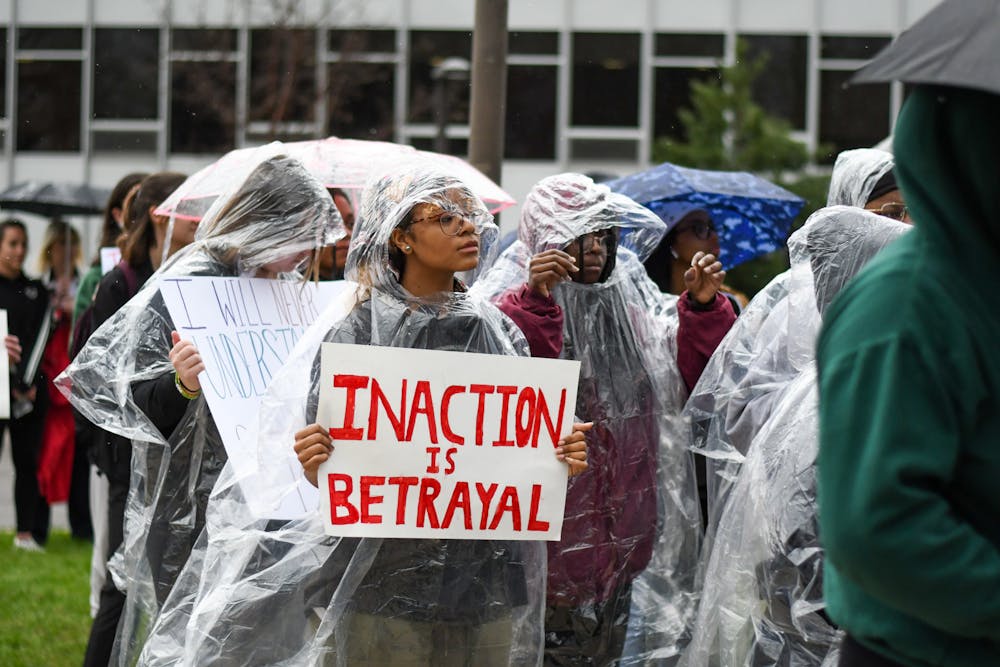Opinion: Our take on events of the week
CM Life editors respond to recent events

Central Michigan freshman Chioma Asomugha holds a sign during a stationed protest, Wednesday, April 17, on the Bovee UC front lawn. The protest moved inside the UC after it started to storm.
Nico Mendoza
Administrators and those in charge of CMU’s student body must grasp the importance of recent events on campus. These events are not isolated, but rather a pattern of unaddressed and uneducated behaviors.
These behaviors have occurred for years, with little or no effort to address the elephant in the room — how long will CMU tolerate behaviors that negatively impact the BIPOC community?
The BIPOC student body is used to show diversity, equity, and inclusion on campus when, internally, the DEI efforts that are supposedly used to support and attract BIPOC students to the university are falling apart.
I came to CMU hoping to pursue my academic career and ambitions of graduating from a university where I am proud to hold a degree. This hope did not last long.
This campus was supposed to be a place where I could thrive and connect with others who had similar identities to me, yet I was met with resistance due to the color of my skin. Now, I feel ashamed to hold a degree from CMU due to the state of the university — mainly its approach to attaining and executing DEI efforts.
My father did not risk his life in seeking a better life for his children just for them to be dismissed due to their skin color.
The ignorance and unwillingness of others concerning historical events that have impacted and influenced generations of BIPOC individuals is one of the many reasons why CMU must address bias incidents immediately with direct actions showing accountability and sincerity.
Experiencing racism is a daily battle that many of us BIPOC students face, and not one we wish to experience at an educational institution.
When racism is brought and harbored in educational institutions once thought to be safe from the harsh realities of the outside world, they become unwelcoming and foreign to BIPOC individuals, — especially when this was an opportunity for them to prosper and be comfortable in their own skin.
Responses have varied, from supportive of those impacted to showing ignorance:
“It’s just a word. Others can use it,”
“CMU is in the middle of nowhere. Of course others will use those words.”
‘This happens in the real world; get used to it.”
And to simply put it, these responses show the educational gap that CMU needs to address with its students regarding BIPOC cultures and history. We are on land that belongs to the Anishinaabe people. Shouldn’t DEI efforts be CMU’s first priority when educating its student body?
But it seems, that we are not enough for important measures to be implemented at an institutional level.
Lauren Rice
As a writer, it is rare that words fail me. It is not rare, in recent days, that I am disappointed. And this week has revealed that there is a lot to be disappointed in: Staff members who will speak racial slurs; students who would be so shameless as to post them.
Most of all, I’m disappointed that it got this bad. This is not the first time for this problem, and if I’m being realistic, it won’t be the last until this university decides to take it seriously.
But what would that even mean? If you asked most people, they would condemn the use of racial slurs, because despite recent evidence I still believe this is a kind, empathetic community. This problem is bigger than any one person. This — like most racism — is systemic.
At the beginning of the year, this newsroom called for the community to engage in difficult conversations. Here’s your opportunity. The listening sessions are a start, but know that I will be watching and waiting for larger change, no matter how long that takes. I always love having good news to report.
I am not a racial minority, so I won’t pretend to have a complete understanding of that experience. But I am trying to empathize. When the shock and anger fade, and sadness or anxiety set in, remember that you have friends in every corner — you are not alone. Equally important: you are not powerless.
History has shown change arise through the voices of college students for generations. We stand on the shoulders of giants who have shown that love is powerful. Remember: when we choose love, we will not lose.







